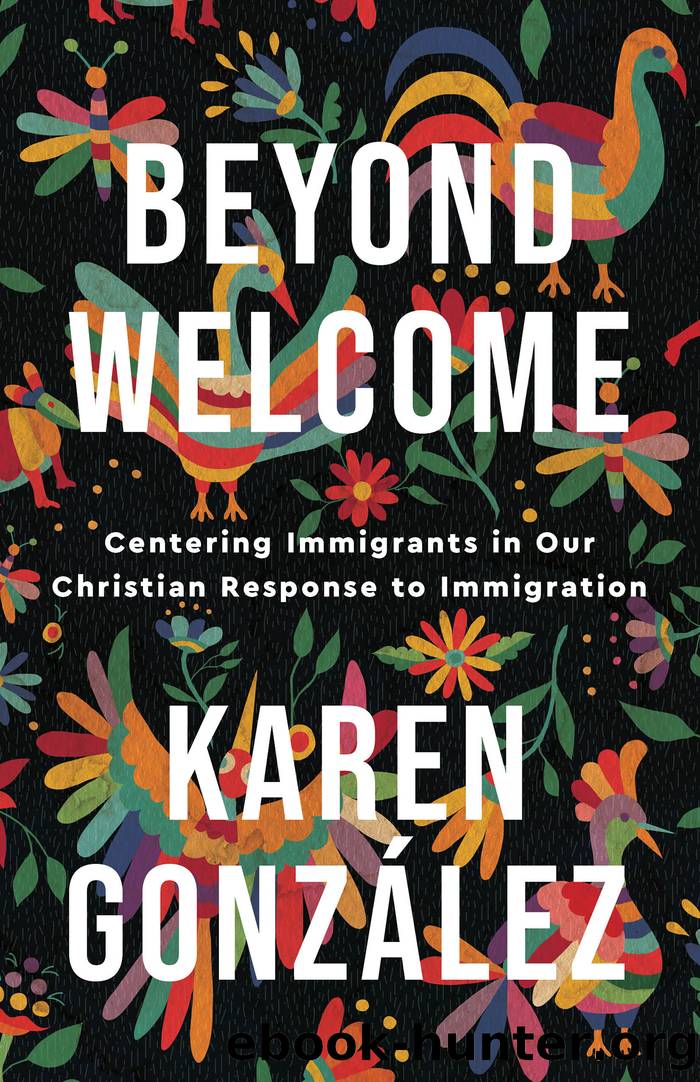Beyond Welcome by Karen González

Author:Karen González
Language: eng
Format: epub
Tags: Christianity/Immigration;Emigration and immigration—Religious aspects—Christianity;Hospitality—Religious aspects—Christianity;REL012110;REL067070;SOC070000
Publisher: Baker Publishing Group
Published: 2022-08-23T00:00:00+00:00
A Reimagined Hospitality
I would love to tell you that in my tiny East Coast city, lovingly called Smalltimore, I hope to run into Mrs. Fisher again so I can ask her if her views on immigration have changed, but I do not. The truth is that she bothered me; as an immigrant person, I found her words offensive. I would not blame any person who chose not to be around her and her loathsome attitude and remarks. Furthermore, as far as I could tell, her hospitality was not reciprocalâshe was not engaged, listening, or learning when I encountered her.
But here is where it becomes complicated: though she was not kind or warm, she actively helped people in need to find the resources necessary to make their home in the US. Would it have been better if her hospitality had been reciprocal and accompanied by kindness and compassion? Absolutely. But all of us can likely attest to the challenges of an always joyful hospitality. In truth, there is no perfect hospitality, but we learn by doing. And there is no doubt that she was actively doing. It raises an important question: Does hospitality need to come with a smile and a warm greeting, or can it be expressed seriously in actions like voting, volunteering, donating, and driving? I believe so; there is value in giving of our time and resources to those in need. Nonetheless, we should always strive toward Jesusâs model of reciprocal hospitality.
In many Latin American countries, hospitality is expressed in the familiar proverb âMi casa es su casa.â It is notable that the saying includes the pronoun âsu,â which stands for the formal âustedâ used when talking to strangers or older people. The phrase means âMy home is your home, stranger.â It is an expression that is well known even in Englishâalmost like a hospitality cliché. But like many expressions that have become clichés, we do not think much about what they are expressing or the deep truths found within them: what is mine is also yours. Make yourself at home because you are in your own home. There is no mine and no yours, only ours.
How does that phrase reimagine the way we think about hospitality to strangers and immigrants? How does it move us beyond the host and guest dichotomy and into reciprocal hospitality? Pastor Isaac Villegas imagines Godâs hospitality as his grandmotherâs houseââa house where there is always room around the kitchen table for another neighbor, another stranger, another guest.â He continues, âGod expands our vision for who are our kin, for who belongs in the household, for who can be served a bowl of arroz con pollo.â9 It is a beautiful imagining of kinship and inclusion.
I remember being awed when I learned that in his lifetime Jesus received and accepted hospitality and financial support from many people found on the margins of the first-century Near East: women, sex workers, tax collectors who were known for cheating people, and other sinners.10 What is perhaps less
Download
This site does not store any files on its server. We only index and link to content provided by other sites. Please contact the content providers to delete copyright contents if any and email us, we'll remove relevant links or contents immediately.
The Secret Power of Speaking God's Word by Joyce Meyer(3154)
Signature in the Cell: DNA and the Evidence for Intelligent Design by Stephen C. Meyer(3123)
Real Sex by Lauren F. Winner(3002)
The Holy Spirit by Billy Graham(2938)
The Gnostic Gospels by Pagels Elaine(2517)
Jesus by Paul Johnson(2349)
Devil, The by Almond Philip C(2323)
23:27 by H. L. Roberts(2245)
The Nativity by Geza Vermes(2221)
Chosen by God by R. C. Sproul(2157)
All Things New by John Eldredge(2149)
Angels of God: The Bible, the Church and the Heavenly Hosts by Mike Aquilina(1950)
The Return of the Gods by Erich von Daniken(1925)
Angels by Billy Graham(1917)
Knowing God by J.I. Packer(1848)
Jesus of Nazareth by Joseph Ratzinger(1801)
The Gnostic Gospel of St. Thomas by Tau Malachi(1781)
How To Be Born Again by Billy Graham(1775)
Evidence of the Afterlife by Jeffrey Long(1773)
